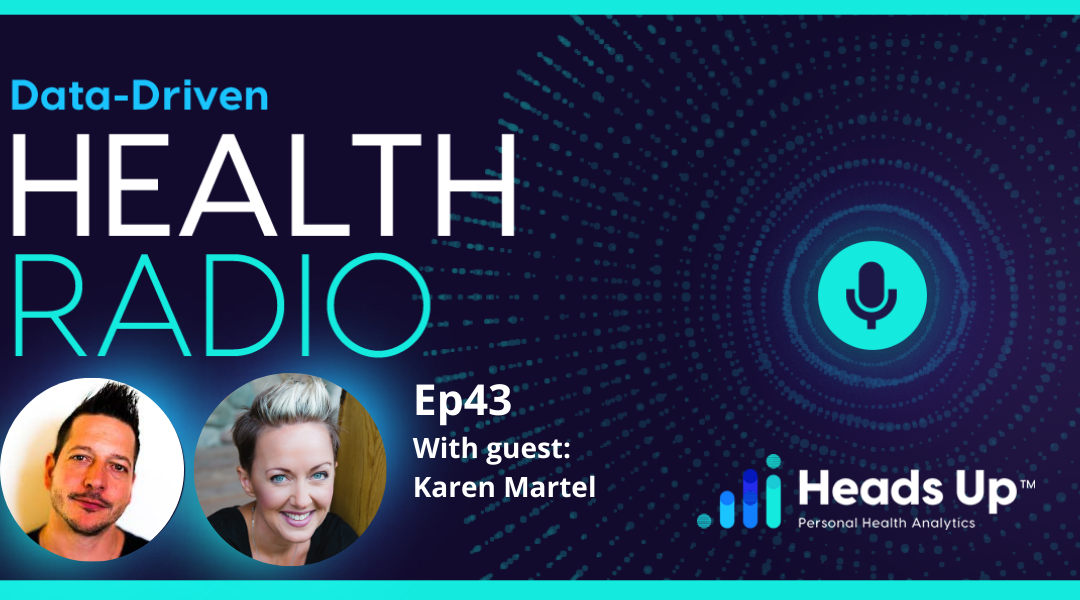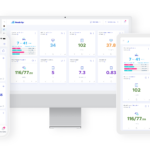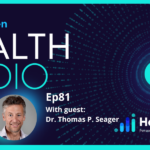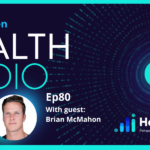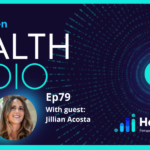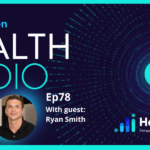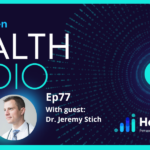Podcast: Play in new window | Download
Subscribe: Apple Podcasts | RSS
Have you tried every diet under the sun yet still have trouble losing stubborn body fat? Even when you fit in regular exercise? Meet Karen Martel, a Transformational Nutrition Coach and Hormone Imbalance and Weight Loss expert from Canada. Despite following mainstream dietary strategies, including plenty of exercise, Karen wasn’t able to lose weight after her pregnancy. She soon figured out the connection to hormone health and quickly rebounded to lose the stubborn weight.
Using strategic testing methods and tracking, Karen Martel now helps her clients to achieve weight loss and lose stubborn body fat when all other methods and diets have failed. With a focus on hormone imbalance, she includes not only the sex hormones — estrogen, progesterone, and testosterone — but also cortisol, as a major indicator of stress intolerance and why the body won’t release excess weight.
If you’re struggling with losing stubborn body fat and need some help or inspiration, listen to this cutting-edge interview with Karen Martel. Learn the most common reasons you might have hormone imbalances and what you can do about it. Become empowered to learn just how to take back your hormone health and get the answers and body you desire!
You can find Karen Martel at www.karenmartel.com where you can book a complimentary 15-minute call, book a session, enroll in group coaching, live coaching, online courses – hormone healthy keto, or order a hormone kit and receive a complimentary 20-minute session with Karen. Be sure to check out her free hormone quiz on her website too!
This podcast is brought to you by Heads Up, a web app designed to help you centrally track all of your vital health data. Instantly synchronize your medical records, connect your favorite health devices and apps and use your data to optimize your health!
Click on the button below to start your free 30-day trial. Or, read on for more information about our latest podcast episode!
[maxbutton id=”5″ url=”https://headsuphealth.com/” ]
In this podcast you’ll learn:
- How to tell if you have a hormone imbalance is happening to you. If you eat well, exercise, and do all the right things but the stubborn body fat won’t budge you likely have a hormone imbalance [8:45]
- If you’re doing keto, low carb, low calorie, and/or fasting and you’re already experiencing some hormonal imbalance, you’re adding fuel to the fire by going too low carb for too long. It’s too much of a stressor when cortisol is already dysregulated to restrict food intake [9:10]
- About Dave’s experience with taking a step back from the day-to-day stress, giving his body time to heal so he could come back and train to regain his strength [10:00]
- Why while running her own business as a single mom, Karen Martel, had to quit Bootcamp and do yoga to allow her body time to heal [11:45]
- Go to www.karenmartel.com to take the screening quiz to see if hormone testing would be warranted for you [13:00]
- How doctors only test blood hormones which only reveal bound hormones that are not what is available for the body to be used. Unbound hormones can only be tested through saliva or urine for metabolite testing. If you can test all three, that would be optimal [14:50]
- If you can only pick one form of testing, choose this one [16:00]
- More about cortisol regulation and testing [16:30]
- Why disrupted cortisol rhythm can lead to insomnia and add to weight gain through dysregulation of ghrelin and other hormones [17:45]
- About the ZRT saliva testing – the Female Comprehensive 3 panel tests estradiol, estrogen, progesterone, the ratio of estrogen and progesterone, testosterone, DHEA, and 4-point cortisol test [19:00]
- How suspected thyroid hormone imbalances can be tested at home with a blood spot kit [21:35]
- Even if you can’t afford to do the specialized tests, go to your doctor and have them run these blood tests for screening [23:00]
- Most common reasons you might have a hormone imbalance and what you can do about it. (Environmental exposures and dietary sources of hormonal imbalance contributors.) [23:45]
- Diet – check this first
- Check estrogens – look for xenoestrogens, in our food, pesticides, plastics, grains, etc.
- Remove scented products from laundry detergent to aftershave and shampoo
- Check water sources
- Opt for at least hormone-free meats
- Remove as many processed foods as possible
- How you can clean your home with natural products very inexpensively [27:45]
- About the quarterly cleanse that Karen Martel runs with her women to support the liver and gallbladder and other detox organs [28:50]
- How fat cells produce estrogen, so the more extra stubborn body fat you carry on your body, the more estrogen you will produce [30:00]
- Why lifting heavy things (strength training) can help you become more healthy and strong, create healthy bones and lower blood sugar [30:45]
- Reasons why regularly doing Crossfit and marathon running can be more stressful on your body. Also, how yoga and lifting weights can be much more beneficial to your hormonal health and weight balance [32:05]
- As women age, we need to work on balancing the body’s stress and bringing our system down like yoga, meditation, tai chi, massage, etc. rather than adding stimulation [33:40]
- As we age, the ovaries begin to shut down production of estrogen and the adrenals take over that task. However, if the adrenals are having to make lots of cortisol, it will favor that task over other hormones. Perimenopausal symptoms will become worse [34:40]
- Hormones go in a 3-month cycle – it’s not a quick fix. Recheck hormones every 3-6 months at least with yourself and your symptoms if you’re unable to do testing [35:10]
- How tracking with Heads Up while working with bioidentical hormones or lifestyle changes can help you keep track of how things are working [36:05]
- HRV and sleep metric tracking can be one of the best metrics to monitor for stress markers – Biostrap, Oura ring, FitBit, etc [36:40]
- How tracking fasting blood sugar is an affordable way to help you lose stubborn body fat. High cortisol will raise blood sugar, especially when it’s high in the morning and comes down later in the day. Even when you’re eating well. This can be an indicator of too much stress on the body [38:00]
- How to use an affordable Gera Thermometer to determine where your metabolism is at. And also to find out if you have indicators for hypothyroidism. Take your temperature for 10 minutes before you get out of bed in the morning (98.6 in AM) and again in the afternoon (98 or 97.9 in the PM). [39:10]
- Track your basal body temperature as mentioned above with the Gera thermometer in Heads Up. An indicator of thyroid issues, as well as adrenal issues depending on the pattern, this can be revealed through tracking [40:32]
- How it’s possible to eat like a normal person again. Once you have in check your blood sugar, hormone imbalances and exercise levels you can enjoy life with occasional indulgences [30:50]
References
https://karenmartel.com/
https://www.zrtlab.com/
www.ewg.org
https://www.ewg.org/tapwater/
https://www.ewg.org/skindeep/
Geratherm Thermometer
About Heads Up
Heads Up is a website designed to empower individuals who want to take a self-directed approach to managing their health. Instantly centralize your medical records, connect your favorite devices and apps (e.g., Oura, MyFitnessPal, Keto-Mojo, FitBit, Apple Health, MyMacros+, Withings and many more) and use your data to optimize your health.
Click on the button below to start your free 30-day trial now!
[maxbutton id=”4″ url=”https://headsuphealth.com/” ]
